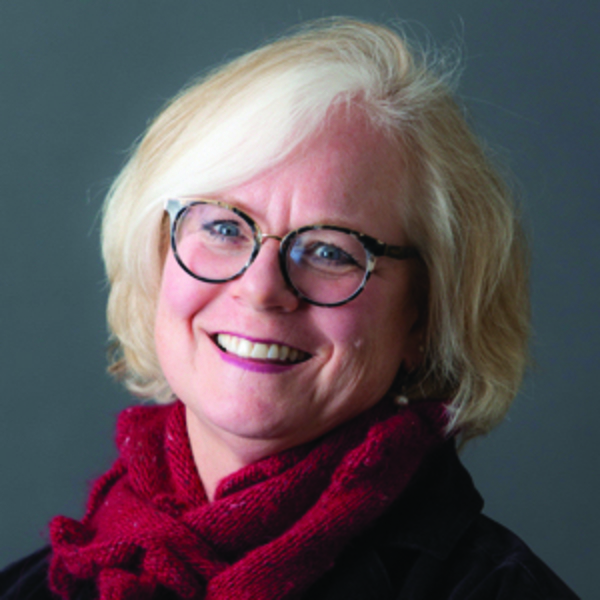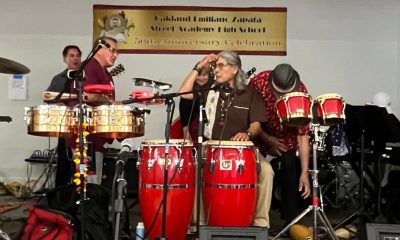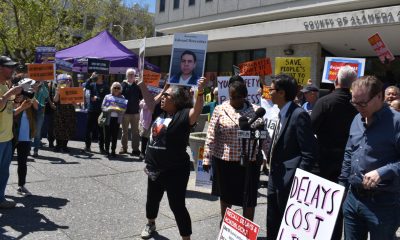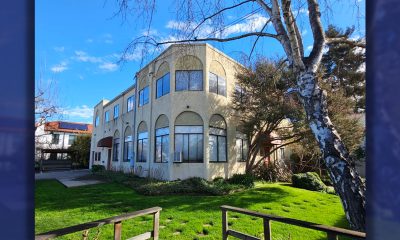Education
Special Education Sees ‘Historic’ Boost in New Funding
Lauren Rhim, executive director of the Center for Learner Equity, which advocates for students in special education, agreed. School districts need to carefully consider how they’re going to spend the money, she said.

Special education in California has been showered with more than $1 billion in new state and federal money in recent weeks, enough to potentially transform a system that’s been underfunded for decades.
“It really is unprecedented and historic,” said Anjanette Pelletier, director of San Mateo County’s Special Education Local Area Plan. “The budget for 2021-22 holds amazing promise for students with disabilities. … It is an amazing time to be thinking about how to use one-time and ongoing resources to support students as we complete extended school-year programs and move into in-person learning in the fall.”
The state budget approved this week includes $656 million in new ongoing funding for special education, including a 4.05 percent increase to the base funding rate. The state also allotted $550 million in one-time funds for addressing disputes between parents and school districts, which are expected to surge in the next few months as students return to the classroom.
In March, the Biden administration set aside $122 billion for schools as part of the American Rescue Plan to help students, including those with disabilities, catch up after a year of distance learning. Of the total, California received $301 million, more than any other state.
On Thursday, the administration added $3 billion more for special education, with about $450 million earmarked for children ages 0-5 with disabilities. Identifying children with disabilities early and connecting them to services leads to better outcomes over the long term, according to a 2020 report by Policy Analysis for California Education.
As a presidential candidate, Joe Biden promised to fully fund special education. Under the Individuals with Disabilities Education Act, students are entitled to a free public education appropriate to their abilities, but the federal government has never reimbursed states for its full share of the cost of educating students with disabilities. Expenses can include services like one-on-one tutoring, occupational and speech therapy, behavioral therapy and technological devices that help students communicate.
Advocates were thrilled with the funding windfall, but cautioned that much will depend on how the money is spent.
“For this to be a game changer in California, it has to mean that all kids get access to high-quality core instruction,” said Sara Doutre, a special education expert at WestEd, an education research firm. “If it’s just more special ed — more separation, more exclusion — it isn’t going to solve anything.”
Lauren Rhim, executive director of the Center for Learner Equity, which advocates for students in special education, agreed. School districts need to carefully consider how they’re going to spend the money, she said.
“If they spend it on things that didn’t work before, then it’s not going to have much of an impact,” she said.
To get the most out of their funding, schools should focus on placing more students with disabilities in general-education classrooms and training teachers to recognize and help students with undiagnosed learning disabilities as they return to school, she said. Many students, especially younger ones, may have disabilities that were not diagnosed during remote learning. And alternately, some students will be misdiagnosed as having learning disabilities when in reality, they’re just behind.
She also suggested that districts invest in “grow your own” teacher pipelines, recruiting and hiring local residents to become special education teachers. The shortage of special education teachers statewide has worsened during the pandemic, as teachers retired early or left for other professions due to burnout.
If spent well, the money could have a significant impact for students with disabilities and their families, she said.
“It doesn’t quite get us there, but it’s very helpful,” said “Am I surprised? No. The investment reflects the commitment the Biden administration has made to support students with disabilities. I think everyone in the special education community right now is saying, ‘Thank you, thank you, thank you.’”
The state’s investment in special education dispute resolution may also have a big impact. During the pandemic, many students with disabilities fell behind because of the challenges of delivering special services virtually. At the same time, some districts have been slow to assess students who might be eligible for special education or need their learning plans updated, leading to a huge backlog in some districts.
Denise Marshall, chief executive of the Council of Parent Attorneys and Advocates, said the funding boost should ease some tensions between families and school districts in the wake of the pandemic.
“The Covid-19 pandemic has placed a tremendous and unprecedented strain on schools, districts, educators, families and students,” she said. “While many of (our) members report that districts are striving to work collaboratively with families to educate students during this challenging time, we also know too many families are not being offered options that meet the full requirements of federal law.”
Activism
S.F. Black Leaders Rally to Protest, Discuss ‘Epidemic’ of Racial Slurs Against Black Students in SF Public School System
Parents at the meeting spoke of their children as no longer feeling safe in school because of bullying and discrimination. Parents also said that reported incidents such as racial slurs and intimidation are not dealt with to their satisfaction and feel ignored.

By Carla Thomas
San Francisco’s Third Baptist Church hosted a rally and meeting Sunday to discuss hatred toward African American students of the San Francisco Unified School District (SFUSD).
Rev. Amos C. Brown, president of the San Francisco NAACP and pastor of Third Baptist Church, along with leadership from local civil rights groups, the city’s faith-based community and Black community leadership convened at the church.
“There has been an epidemic of racial slurs and mistreatment of Black children in our public schools in the city,” said Brown. “This will not be tolerated.”
According to civil rights advocate Mattie Scott, students from elementary to high school have reported an extraordinary amount of racial slurs directed at them.
“There is a surge of overt racism in the schools, and our children should not be subjected to this,” said Scott. “Students are in school to learn, develop, and grow, not be hated on,” said Scott. “The parents of the children feel they have not received the support necessary to protect their children.”
Attendees were briefed last Friday in a meeting with SFUSD Superintendent Dr. Matt Wayne.
SFUSD states that their policies protect children and they are not at liberty to publicly discuss the issues to protect the children’s privacy.
Parents at the meeting spoke of their children as no longer feeling safe in school because of bullying and discrimination. Parents also said that reported incidents such as racial slurs and intimidation are not dealt with to their satisfaction and feel ignored.
Some parents said they have removed their students from school while other parents and community leaders called on the removal of the SFUSD superintendent, the firing of certain school principals and the need for more supportive school board members.
Community advocates discussed boycotting the schools and creating Freedom Schools led by Black leaders and educators, reassuring parents that their child’s wellbeing and education are the highest priority and youth are not to be disrupted by racism or policies that don’t support them.
Virginia Marshall, chair of the San Francisco NAACP’s education committee, offered encouragement to the parents and students in attendance while also announcing an upcoming May 14 school board meeting to demand accountability over their mistreatment.
“I’m urging anyone that cares about our students to pack the May 14 school board meeting,” said Marshall.
This resource was supported in whole or in part by funding provided by the State of California, administered by the California State Library via California Black Media as part of the Stop the Hate Program. The program is supported by partnership with California Department of Social Services and the California Commission on Asian and Pacific Islander American Affairs as part of the Stop the Hate program. To report a hate incident or hate crime and get support, go to CA vs Hate.
Community
ELITE Charter School Conducts Sit-In Protest at Vallejo City Hall After City Council Vote
ELITE Public School staff and students staged a sit-in at Vallejo City Hall on Wednesday afternoon to protest the City Council’s decision to vote against their Major Use Permit to expand into downtown. “We are deeply troubled by the turnover of the 6-1 vote, which we believe to be red-lining in 2024,” said Dr. Ramona Bishop, CEO of ELITE Public Schools.

By Magaly Muñoz
ELITE Public School staff and students staged a sit-in at Vallejo City Hall on Wednesday afternoon to protest the City Council’s decision to vote against their Major Use Permit to expand into downtown.
“We are deeply troubled by the turnover of the 6-1 vote, which we believe to be red-lining in 2024,” said Dr. Ramona Bishop, CEO of ELITE Public Schools. “We have followed all the requirements set forth for approval by the city and are dismayed by this sudden reversal of fortune. Our sit-in at City Hall is a testament to our unwavering commitment to justice and fairness.”
The sit-in was triggered after the Vallejo City Council members held a lengthy, special meeting on Tuesday evening to continue discussing the April 23 appeal that was made against the Planning Commission’s decision to grant ELITE a permit for expanding their charter high school into a retrofitted building in the heart of downtown.
During the deliberations, various options were presented to the Council for approving the project. These included a provisionary review period for the permit and imposing extensive conditions, such as limiting student enrollment.
The ELITE plan was to accommodate a maximum capacity of 400 students at their proposed school site, starting with an initial rollout capacity of 200 students in the first year.
Bishop rejected the suggestion by the City Council for a smaller charter capacity because the funding for the school was based on the projected number of students they would eventually seat.
During the meeting, council members complained about the lack of availability of economic impact reports that assessed the school’s potential impact on Vallejo’s downtown area.
Economic Development Director Michael Nimon sent a letter to the City Council, stating that while there was no official report, schools serve as economic generators to the surrounding areas of where they’re located.
“Schools also diversify uses and create pedestrian activity by bringing more people to downtown. Diversification of uses makes local economy more resilient by balancing residential, commercial, office, entertainment, and institutional uses,” Nimon’s letter said.
The letter also states that foot traffic is needed in an area of Vallejo that currently has minimal activity and the presence of the proposed school will likely not disturb any future developments.
Despite this, the council dismissed the letter as “merely an opinion” and not anything based on fact or concrete data.
Councilmember Peter Bregenzer, who remained silent throughout most of the seven-hour discussion, ultimately motioned for City staff to draft a resolution to approve the appeal and deny the project. The motion passed by a 4-3 vote.
About 50 students gathered on the second floor of the City Hall building where they chanted “Say it loud, say it clear, we don’t want no racists here” and “Where is the mayor? Bring him out, bring him out.”
The proposed high school has sparked intense debate, with many speculating that those opposed to the school are saying no to the expansion because the majority of the students are Black and Brown.
Retired Solano County Judge Paul Beeman and his wife, Donna, who filed the appeal against the school, have consistently denied that their opposition stems from racism or personal feelings toward anyone associated with the school.
In interviews with the Post, the Beemans seem to regard the proposed high school as a “nuisance” and an ill-advised choice for downtown development. They claim that it would be ineffective in economically revitalizing the community. However, they have provided no substantial evidence to support their opinions.
In contrast, ELITE has drawn parallels to redlining in relation to the community’s opposition to the proposed school location. Redlining refers to the discriminatory practice in which mortgage companies and other financial services systematically withhold loans and access to predominantly white neighborhoods from racial and ethnic minorities, particularly Black and African American communities.
“We’ve been fighting for this school for two years. We’re going to make our emergency, their emergency,” one student said in reference to Vallejo Mayor Robert McConnell’s previous comments about not rushing to make a decision on the school permit.
Within two hours of the start of the sit-in at City Hall, the City of Vallejo issued a statement that the building would be closed for the rest of the day because of the protest. The statement said that the loud noise from the protesters “hindered staff and visitors’ ability to conduct regular business.”
Although the mayor was not present at City Hall on Wednesday afternoon, interim City Manager Beverli Marshall addressed the ELITE group to answer several questions the students had. She explained the appeal process, how the different city officials played a role in the decision, and what the possible outcomes could be after the Council makes its final decision in a few weeks.
Students and staff were ultimately upset that they were being treated like criminals and that all their work over the last two years might be in vain since they believed that the Council had zero intention of ever granting them the permit in the first place.
The City Council is scheduled to meet for another special meeting on June 4 at 7 p.m. to continue discussing the future of ELITE Public Schools.
Community
Salesian Coach Knew Angel Jackson Could Play in WNBA
Back in 2019, Salesian Girls Basketball Head Coach Stephen Pezzola made a bold prediction about one of his players, Angel Jackson. “If she keeps putting in the work like she did for us, she could be in the WNBA,” the coach said. That turned out to be very true. Last month, the Las Vegas Aces selected Jackson with the 36th overall pick in the 2024 WNBA Draft. She is the second player from an Historically Black College or University, or HCBU, to be selected in the draft in 20 years.

The Richmond Standard
Back in 2019, Salesian Girls Basketball Head Coach Stephen Pezzola made a bold prediction about one of his players, Angel Jackson.
“If she keeps putting in the work like she did for us, she could be in the WNBA,” the coach said.
That turned out to be very true. Last month, the Las Vegas Aces selected Jackson with the 36th overall pick in the 2024 WNBA Draft. She is the second player from an Historically Black College or University, or HCBU, to be selected in the draft in 20 years.
Jackson’s success came as little surprise to Pezzola, who last year led the Pride to their 8th North Coast Section championship since he took over the program in 2008-2009. In 2019, Pezzola commended Jackson as “a very coachable kid” from the time she arrived at Salesian.
Tomekia Reed, her coach at Jackson State, shared similar sentiments, noting Jackson worked “very hard” to reach this moment.
“She came into our program doing great things and never looked back,” Reed told the Clarion Ledger. “She has trusted our leadership as we were able to develop her into an amazing player. I have watched her improve tremendously over the years.”
The 6’-6” Jackson played three seasons at the University of Southern California before transferring to Jackson State. She was ranked 10th in the NCAA in blocked shots and averaged 10 points per game in her final college season.
She finished her collegiate career with 1,047 points and was twice named Southwestern Athletic Conference Defensive Player of the Year.
As the 36th pick, Jackson was the final pick in the 2024 NBA Draft. In a television interview, Jackson said she didn’t expect to be picked, and called the moment “surreal.”
“It made me feel so appreciative that HBCU is getting back on the map again,” she said.
All she could do in that moment was cry.
“I called my mom immediately, and she started crying,” Jackson said. “It was the best moment you can feel as a young lady.”
There’s no stopping Jackson now. “The sky is the limit,” she said.
Her high school coach agrees.
“I knew that Angel could do it,” Coach Pezzola told the Richmond Standard this week. “We are so proud of Angel and what she has accomplished. It was an honor and joy to coach Angel at Salesian.”
-

 Community3 weeks ago
Community3 weeks agoFinancial Assistance Bill for Descendants of Enslaved Persons to Help Them Purchase, Own, or Maintain a Home
-

 Business3 weeks ago
Business3 weeks agoV.P. Kamala Harris: Americans With Criminal Records Will Soon Be Eligible for SBA Loans
-

 Activism4 weeks ago
Activism4 weeks agoOakland Post: Week of April 10 – 16, 2024
-

 Community3 weeks ago
Community3 weeks agoAG Bonta Says Oakland School Leaders Should Comply with State Laws to Avoid ‘Disparate Harm’ When Closing or Merging Schools
-

 Activism2 weeks ago
Activism2 weeks agoOakland Post: Week of April 24 – 30, 2024
-

 City Government3 days ago
City Government3 days agoCourt Throws Out Law That Allowed Californians to Build Duplexes, Triplexes and RDUs on Their Properties
-

 Community2 weeks ago
Community2 weeks agoRichmond Nonprofit Helps Ex-Felons Get Back on Their Feet
-

 Community2 weeks ago
Community2 weeks agoOakland WNBA Player to be Inducted Into Hall of Fame


















































